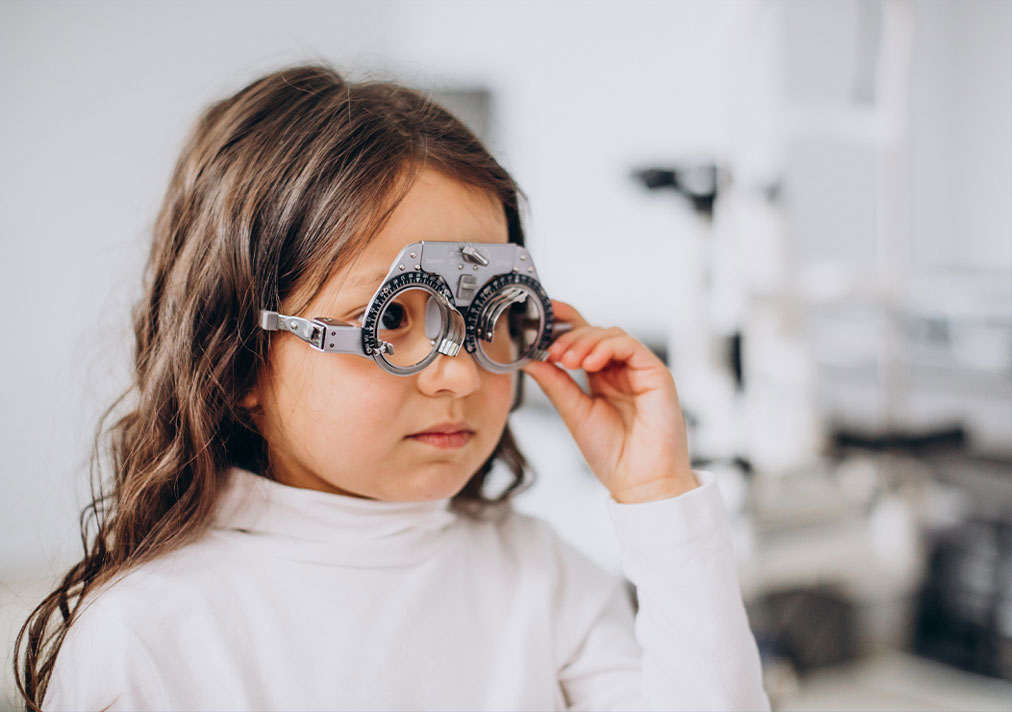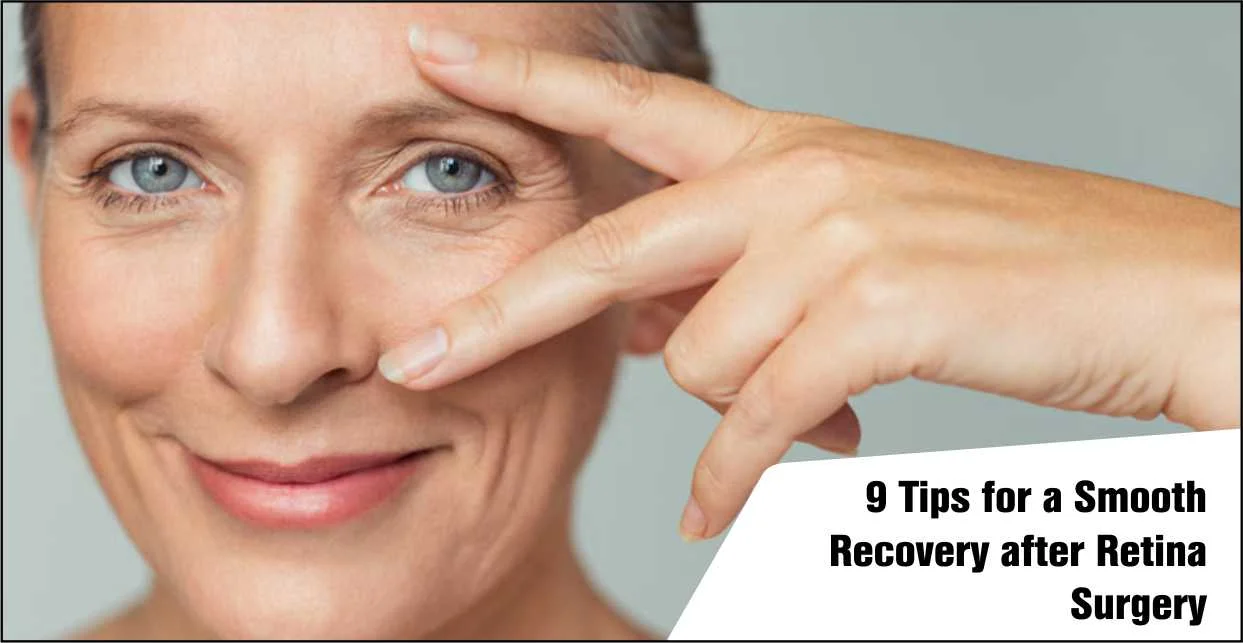Our eyes are potentially one of the most delicate organs in our body, playing one of the most significant tasks of letting us view the beautiful world around us. However, there are times when severe complications like retinal detachment, macular holes, or diabetic retinopathy can impact the retina inadvertently.
In times like these, retina surgery is the most common route of treatment, which corrects the complications and helps restore the patient’s vision. Eye-Q Super Speciality Eye Hospitals is renowned for comprehensive retina surgery and treatment.
Essential Tips For Smooth Recovery After Retina Surgery
An essential aspect of this surgery is the recovery after the procedure. If you want to avert complications and have a smoother healing journey, the following 9 tips should come in handy.
1. Strictly Adhere to Your Post-Surgery Care Plan
Right after you are done with the surgery, you will be directed to recovery, where the surgeon will instruct you and your family members about the post-surgery care plan. These tips will be aligned to your specific needs and will include:
- You will be prescribed a series of medications, including antibiotic and anti-inflammatory medications and eye drops, to prevent infection and keep the swelling in check.
- Despite the fact that it is eye surgery, you’d be instructed to avoid heavy lifting, bending and sudden head movements since that can impact the retina further.
- To prevent accidental injuries and keep irritants out of the eyes, you’d also be instructed to wear protective eye gear like eye shields, specialised post-surgical glasses, etc.
Following all the recommendations after the post-surgery care plan helps you prevent complications such as infections, further retinal detachment and increased intraocular pressure (IOP). Also, since taking all the medications on time is necessary, you can set an alarm to provide timely reminders.
2. Understand and Follow the Recommended Head Positioning
Maintaining the correct head position is critical for patients with a gas or oil bubble inserted during surgery. The bubble that’s inserted usually acts as a temporary support structure for the retina until it is healed completely.
You might be asked to remain face-down to keep the bubble in contact with the retina. Specialised equipment like face-down chairs, pillows, and headrests can make this position more comfortable to stick to.
It could be days or weeks if you are curious how long you’d have to maintain this position. Usually, the surgeon communicates the same information to the patient after the surgery. Prioritising correct head positioning ensures that the bubble is intact, which, in turn, reduces the risks of surgical failure.
3. Avoid Activities That Increase Eye Pressure or Strain
As previously mentioned, you’d need to prevent unnecessary physical activities during the recovery period after retina surgery. Since your eye is already highly sensitive post-op, increased pressure from physical strain can further delay the healing or lead to complications.
Following are a few pointers to keep in mind:
- Avoid picking up any physical object weighing over 5-10 pounds.
- You have to avoid strenuous activities like running, jumping or weightlifting.
- Bending over unnecessarily can increase pressure on the eyes, so avoid that.
- Intense screen time is another factor you have to avoid since prolonged screen time can cause eye strain and dryness.
After the retina surgery, you’d usually have to refrain from exerting yourself for around 4-6 weeks until your eyes have healed and there are no risks of surgical failure involved. The key is to avoid excess intraocular pressure since it is known to damage the healing retina.
4. Use Eye Protection at All Times
Following the retina surgery, your eyes are susceptible to many issues like injuries, infections, and irritants. So, it is quintessential that you have all the necessary protective measures in place, including:
- Be sure to wear eye shields while sleeping and during the day to prevent accidental rubbing or eye injuries.
- Wear sunglasses for a few weeks after the surgery to shield your eyes against UV rays and environmental pollutants.
- Unnecessary exposure to dust or debris can irritate the eye and increase the risk of infection, so avoid dusty environments.
Since the risks of infections and unintentional trauma can reverse the surgery’s success, it is essential to prioritise protection at all times.
5. Stick to the Prescribed Medication Schedule
Your surgeon at Eye-Q will provide a detailed prescription with a list of all the medications you need to consume after your surgery. From eye drops to antibiotic oral medications, every specific medication has a role to play.
These typically include:
- Antibiotic eye drops: Prevent infection at the surgical site.
- Steroidal drops: Reduce inflammation and swelling.
- Pain relievers: Manage discomfort during the healing process.
You need to ensure that you aren’t skipping out on any of the prescribed medications and consume them or apply them at correct intervals, too. Also, do not skip doses since that might compromise healing, which is the last thing you want after your retina surgery.
6. Prioritise a Nutrient-Rich Diet for Faster Healing
Beyond following the instructions specified by your surgeon, the food you consume also contributes to the healing and recovery. Eating a balanced diet enriched with all the essential nutrients is thus vital in promoting eye health and ensuring proper healing after the surgery.
Following are a few tips to consider:
- You must include foods rich in vitamins A and C, including carrots, sweet potatoes, citrus fruits, and green leafy vegetables, which strengthen the eyes and the tissues.
- You can include foods like shellfish, beans and nuts, which have zinc, ideal for cellular repair.
- You must also prioritise eating fish, flaxseeds, and walnuts, which reduce inflammation and improve overall eye health since they have omega-3 fatty acids in them.
Beyond all that, hydration is key, too. If you are not hydrated enough, it can lead to dry eyes, which can impact the healing of the retina after the surgery.
7. Schedule and Attend All Follow-Up Appointments
Follow-up appointments after your retina surgery is mandatory to keep a check on the healing progress and also keep an eye out for any potential complications.
During these visits, your doctor will:
- Monitor the healing process.
- Check the gas or oil bubble’s position, if applicable.
- Adjust medications based on your recovery progress.
Usually, the first follow-up appointment is one week after the surgery, followed by periodic visits every few weeks. In post-op complications like retinal swelling and detachment, these visits can ensure early detection and prevent long-term vision problems.
8. Learn to Identify and Respond to Warning Signs
Specific symptoms after retina surgery may indicate complications that require immediate medical attention. You have to keep an eye out for:
- Severe or persistent eye pain: Could signal increased intraocular pressure or other complications.
- Sudden vision changes: Such as loss of vision, flashes of light, or excessive floaters.
- Redness and swelling: If accompanied by discharge, this may indicate infection.
If you experience any of these symptoms that seem to worsen progressively over an hour, you must consult your eye surgeon immediately. The earlier the intervention, the quicker you will get the needed help.
9. Rest Your Eyes and Minimise Strain During Recovery
Last but not least, one of the most essential tips to optimise healing and recovery after retina surgery is to rest your eyes and prevent unnecessary strain.
A few tips that can help achieve that are:
- To ensure that your retina heals appropriately and there is no rise in pressure inside the eyes, avoid prolonged screen time.
- If you must work or study, follow the 20-20-20 rule: Look away every 20 minutes at an object 20 feet away for 20 seconds.
- Detailed tasks like reading or concentrating hardly on something can strain the eyes and derail recovery after the surgery, so avoid that, too.
- For the first 2-3 weeks, prioritise these tips to minimise eye strain and ensure that your retina heals appropriately.
Prioritise Care for Optimal Vision!
Recovering from retina surgery requires patience, diligence, and adherence to medical advice. These 9 tips are designed to help you navigate the recovery process smoothly while ensuring the long-term health of your eyes.
Eye-Q Super Specialty Hospitals is dedicated to providing comprehensive care before, during, and after retina surgery. With our expert ophthalmologists, you receive personalised care that ensures your vision is in the best hands.
For enquiries and to schedule a consultation, kindly call us at +91782 400 1110. You can also email us at info@eyeqindia.com for more details.
FAQ’s
1. How To Improve Vision After Retinal Detachment Surgery?
After retinal detachment surgery, you must closely adhere to all post-operative recommendations in order to improve your eyesight. It is advised to avoid physically demanding activities, use prescription eye drops on a regular basis, and shield your eyes from dust and strong light. At Eye-Q Superspeciality Eye Hospitals, we take pride in your recovery and offer professional treatment and assistance all along the way. Put your trust in our eye care specialists, we can help you achieve healthier, clearer eyesight at every turn.
2. What To Eat After Retinal Detachment Surgery?
You can heal well after retinal detachment surgery by consuming a healthy, nutritious diet. You should add leafy greens along with carrots and citrus fruits into your meals because they supply antioxidants that benefit your eyes. The recovery process benefits through the consumption of omega-3 fatty acids present in fish, combined with flaxseeds. Hydration should also be adequately maintained. However, ensure to stay away from processed foods containing excess sugar and salt. Besides, the size and portion of your meals should be appropriate for managing nausea and weakness post-surgery. Nevertheless, always consult your eye doctor before making changes to your meals, as they will recommend the best dietary approach for recovery.
3. How Long Does It Take To Recover After Retinal Detachment Surgery?
The duration of your retinal detachment surgery recovery depends on your overall health condition and the extent of detachment. Your vision will show slow improvement during a period of 4 to 6 weeks. However, complete healing will require months. Therefore, you must show patience along with proper care practices throughout the recovery period. Also, take complete rest during the recovery period, along with maintaining lightweight restrictions and adherence to scheduled follow-up visits with your eye specialist.
4. Is Vision Fully Restored After Retinal Detachment Surgery?
Yes, your vision can be restored after retinal detachment surgery, but with some limitations. The condition of your vision after the surgery relates to how early the doctor performed the treatment and how much damage occurred. Primarily, receiving timely treatment offers better prospects of achieving good vision again, although your end results might differ slightly from your original state. Most patients notice minor blurriness while their vision becomes distorted and peripheral view diminishes slightly. You should control your vision expectations and let your eyes recover according to the prescribed guidelines so you can achieve the best possible results.
5. How to Undertake Recovery of the Detached Retina?
Recovering from a detached retina is mainly a gradual process which requires careful attention. The timeline for the detached retina recovery is mainly known to vary depending on the severity of the detachment and the type of surgery performed. Most of the patients begin to notice several improvements in vision just within a few weeks. However, please note that complete healing may take several months.
During this period, it is crucial to avoid any strenuous activity like heavy lifting or any movement which may increase the pressure in the eye. In some cases, the doctor may also advise you to maintain a specific head position, which is often face down, if a gas bubble is used to reach the retina.
6. What kind of glasses are needed after a Retinal Detachment Surgery?
Immediately after the surgery, the vision may appear to be distorted or blurred. While this is common, there is a need for prescription glasses after retinal detachment. So, it does not matter if you need new glasses or how much of your vision changes, there is always a need to opt for special prescription glasses.
Some individuals may also see some shifts in the reflective error; in case the scleral buckle has been used. This can slightly alter the shape of the eye, and in such cases, the updated prescription lenses may be used to significantly improve clarity and comfort.
When you get new glasses after retinal detachment surgery, you must ensure to:
- Wait for stabilisation: Do not order new glasses immediately after the surgery, as the vision changes over time as your eye heals.
- Follow Post-Operative Instructions: Your doctor may provide specific instructions on when it is safe to resume activities.
- Use Protective Eyewear: The UV rays from the sun may damage your eyes; therefore, it is essential to opt for a lens with UV protection.
After the eye heals, you must opt for an updated prescription, request safety lenses, and adjust your home to prevent falls and sudden problems while moving.




